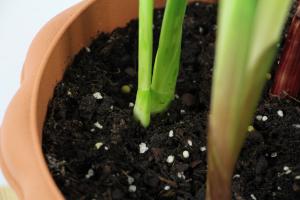How to Care for a Patio Tomato Plant
Tomatoes are a popular crop for home gardeners because they are relatively easy to grow, even in small spaces. Patio tomato plants are a great option for people with limited outdoor space, as they can be grown in containers on patios or balconies. Here are some tips for caring for your patio tomato plant:
Choosing a Container
The first step in caring for your patio tomato plant is choosing the right container. It should be large enough to accommodate the plant's root system, but not so large that it takes up too much space on your patio. A 15-gallon container is usually a good size for a single tomato plant. Make sure the container has drainage holes in the bottom to prevent water from pooling and causing root rot.
Choosing a Tomato Variety
There are many different varieties of tomatoes to choose from, and not all of them are suitable for container gardening. Look for determinate or "bush" varieties, as they will grow to a manageable size and won't take over your patio. Some good varieties for container gardening include 'Celebrity', 'Patio', and 'Husky Cherry Red'.
Watering
Tomatoes need consistent moisture to grow well, but they can also be susceptible to overwatering. Water your patio tomato plant deeply once or twice a week, depending on weather conditions. Be sure to water the soil directly and not the leaves, as wet leaves can lead to fungal diseases.
Fertilizing
Container-grown tomatoes need to be fertilized regularly to ensure healthy growth and fruit production. Use a balanced fertilizer with equal parts nitrogen, phosphorus, and potassium, such as a 10-10-10 or 20-20-20 blend. Apply the fertilizer every two weeks, following the manufacturer's instructions for application rate.
Pruning
Pruning your patio tomato plant can help keep it under control and encourage better air circulation, which can prevent diseases. Pinch off the suckers that grow in the crotches between the main stem and the branches, as these can divert energy away from fruit production. Remove any yellowing or diseased leaves that you notice, as well.
Pest and Disease Control
Tomatoes can be susceptible to a variety of pests and diseases, such as aphids, spider mites, and blight. Inspect your patio tomato plant regularly for signs of pest infestation or disease, and take action immediately if you notice anything unusual. You can use insecticidal soap or neem oil to control pests, and a copper-based fungicide to prevent blight.
Harvesting
Patio tomato plants will start to produce fruit about 60 to 80 days after planting. Be sure to harvest your tomatoes when they are ripe, as leaving them on the plant too long can cause them to split or rot. Tomatoes are ripe when they are firm but slightly soft to the touch, and have a deep, rich color.
By following these tips for caring for your patio tomato plant, you can enjoy fresh, homegrown tomatoes even if you have limited outdoor space. With a little bit of effort and attention, you can get a bountiful harvest from your container-grown tomatoes. Happy gardening!

 how many times do yo...
how many times do yo... how many planted tre...
how many planted tre... how many pine trees ...
how many pine trees ... how many pecan trees...
how many pecan trees... how many plants comp...
how many plants comp... how many plants can ...
how many plants can ... how many plants and ...
how many plants and ... how many pepper plan...
how many pepper plan...






























